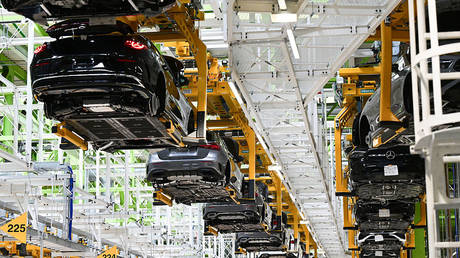World
German Automakers Face Over €10 Billion Loss from U.S. Tariffs

Germany’s automotive industry is projected to suffer losses exceeding €10 billion (approximately $11.6 billion) in cash flow this year due to U.S. trade tariffs, according to a study referenced by the Financial Times. This comes at a time when the sector is already grappling with escalating energy costs, dwindling sales, and fierce competition from China.
The United States is Germany’s most significant foreign market, and the tariffs imposed by former President Donald Trump have severely impacted the nation’s car manufacturers. In March 2023, Trump enacted a 25% tariff on imports of foreign-made vehicles, exacerbating the challenges faced by the industry.
Impact on Major Automakers
Recent analyses suggest that major companies in the sector will experience significant reductions in their cash flow. For instance, Mercedes-Benz is expected to see its cash flow plummet from nearly $11 billion to around $3 billion this year, as detailed by analytics platform Visible Alpha. Meanwhile, Volkswagen’s cash flow forecast has been revised down to $3.8 billion, less than half of last year’s figure of $9.5 billion. BMW anticipates a slight dip to $5 billion.
On July 7, 2023, Volkswagen reported that the tariffs had already cost the company over $1 billion in the first half of the year, with expectations that this burden may increase further. Suppliers have also been affected, passing on higher costs of imported components and raw materials, including aluminum and steel, which has further squeezed profit margins.
EU-U.S. Trade Deal Reactions
The recent EU-U.S. trade deal, reached during a meeting between Trump and Ursula von der Leyen, President of the European Commission, established a baseline 15% tariff on most exports, including cars. Although both leaders hailed the agreement as a “powerful” and “stabilizing” breakthrough, it has sparked backlash within the European Union. Some officials have labeled the outcome “scandalous” and “a disaster,” arguing that it failed to secure meaningful concessions from the United States. The German Federation of Industries described the deal as an “inadequate compromise,” highlighting the tariff reduction as the only positive aspect.
The ongoing decline of Germany’s auto sector raises concerns about the overall health of the country’s economy, which is the largest manufacturing economy in the EU. The International Monetary Fund has forecast zero growth for Germany in 2023, predicting it will be the only G7 country to experience stagnation this year.
As the automotive industry continues to navigate these turbulent waters, the impact of U.S. tariffs will remain a critical issue for Germany’s economic future. The combination of rising operational costs, decreased demand, and international trade tensions poses significant challenges that stakeholders will need to address moving forward.
-

 Entertainment2 months ago
Entertainment2 months agoIconic 90s TV Show House Hits Market for £1.1 Million
-

 Lifestyle4 months ago
Lifestyle4 months agoMilk Bank Urges Mothers to Donate for Premature Babies’ Health
-

 Sports3 months ago
Sports3 months agoAlessia Russo Signs Long-Term Deal with Arsenal Ahead of WSL Season
-

 Lifestyle4 months ago
Lifestyle4 months agoShoppers Flock to Discounted Neck Pillow on Amazon for Travel Comfort
-

 Politics4 months ago
Politics4 months agoMuseums Body Critiques EHRC Proposals on Gender Facilities
-

 Business4 months ago
Business4 months agoTrump Visits Europe: Business, Politics, or Leisure?
-

 Lifestyle4 months ago
Lifestyle4 months agoJapanese Teen Sorato Shimizu Breaks U18 100m Record in 10 Seconds
-

 Politics4 months ago
Politics4 months agoCouple Shares Inspiring Love Story Defying Height Stereotypes
-

 World4 months ago
World4 months agoAnglian Water Raises Concerns Over Proposed AI Data Centre
-

 Sports4 months ago
Sports4 months agoBournemouth Dominates Everton with 3-0 Victory in Premier League Summer Series
-

 World4 months ago
World4 months agoWreckage of Missing Russian Passenger Plane Discovered in Flames
-

 Lifestyle4 months ago
Lifestyle4 months agoShoppers Rave About Roman’s £42 Midi Dress, Calling It ‘Elegant’









